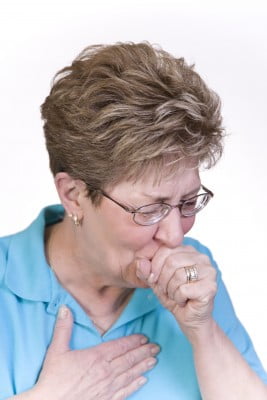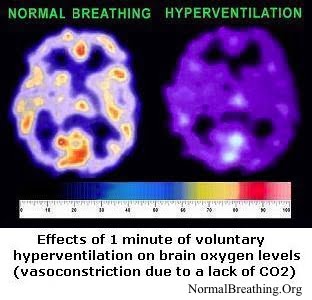- Updated on September 24, 2019
![]() By Dr. Artour Rakhimov, Alternative Health Educator and Author
By Dr. Artour Rakhimov, Alternative Health Educator and Author
 In order to find the best cough suppressant, we need to find the cause of coughing, but let us start with the effects of coughing. People with coughing have high minute ventilation rates. While normal breathing at rest requires only 6 liters of air per minute (as occurs in healthy subjects), coughing increases ventilation at least up to 3-4 times. As a result, people breathe up to 15-20 liters per minute or more. Later, after bouts of coughing are subsided, the person continues to breathe much more than the medical norm (or has chronic hyperventilation) due to reset of the respiratory center to lower CO2.
In order to find the best cough suppressant, we need to find the cause of coughing, but let us start with the effects of coughing. People with coughing have high minute ventilation rates. While normal breathing at rest requires only 6 liters of air per minute (as occurs in healthy subjects), coughing increases ventilation at least up to 3-4 times. As a result, people breathe up to 15-20 liters per minute or more. Later, after bouts of coughing are subsided, the person continues to breathe much more than the medical norm (or has chronic hyperventilation) due to reset of the respiratory center to lower CO2.
Low CO2 levels in the airways (alveolar hypocapnia) irritate urge-to-cough nerve receptors located in the tracheobronchial tree and larynx (see the links below) causing chronic problems with coughing.
It is known that coughing is very common in people with, for example, asthma, bronchitis, COPD, and cystic fibrosis. Do they have heavy breathing at rest?
Ventilation rates (chronic diseases)
| Condition | Minute ventilation |
Number of people |
All references or Click below for abstracts |
| Normal breathing | 6 L/min | – | Medical textbooks |
| Healthy Subjects | 6-7 L/min | >400 | Results of 14 studies |
| Asthma | 13 (+-2) L/min | 16 | Chalupa et al., 2004 |
| Asthma | 15 L/min | 8 | Johnson et al., 1995 |
| Asthma | 14 (+-6) L/min | 39 | Bowler et al., 1998 |
| Asthma | 13 (+-4) L/min | 17 | Kassabian et al., 1982 |
| Asthma | 12 L/min | 101 | McFadden, Lyons, 1968 |
| COPD | 14 (+-2) L/min | 12 | Palange et al., 2001 |
| COPD | 12 (+-2) L/min | 10 | Sinderby et al., 2001 |
| COPD | 14 L/min | 3 | Stulbarg et al., 2001 |
| Cystic fibrosis | 15 L/min | 15 | Fauroux et al., 2006 |
| Cystic fibrosis | 10 L/min | 11 | Browning et al., 1990 |
| Cystic fibrosis* | 10 L/min | 10 | Ward et al., 1999 |
| CF and diabetes* | 10 L/min | 7 | Ward et al., 1999 |
| Cystic fibrosis | 16 L/min | 7 | Dodd et al., 2006 |
| Cystic fibrosis | 18 L/min | 9 | McKone et al., 2005 |
| Cystic fibrosis* | 13 (+-2) L/min | 10 | Bell et al., 1996 |
| Cystic fibrosis | 11-14 L/min | 6 | Tepper et al., 1983 |
What are the effects of hyperventilation? It leads to low CO2 levels in the lungs, which reduces oxygen levels in body cells. Tissue hypoxia increases inflammation and suppresses the immune system (see the links below). Thus, hypocapnia (reduction in carbon dioxide levels in the lungs) is a suppressant of the immune system.
 Note that some people can experience arterial hypercapnia (increased CO2) due to low CO2 in the lungs since carbon dioxide has a profound positive effect on lung tissue. It dilates bronchi and bronchioles immediately improving the ventilation-perfusion ratio.
Note that some people can experience arterial hypercapnia (increased CO2) due to low CO2 in the lungs since carbon dioxide has a profound positive effect on lung tissue. It dilates bronchi and bronchioles immediately improving the ventilation-perfusion ratio.
Those who have healthy lungs suffer from arterial hypocapnia (low CO2 in the blood), and that reduces blood and oxygen supply to all vital organs (see the picture on the right).
CO2: natural cough suppressant
Carbon dioxide is among the best natural cough suppressant since it is the most needed chemical to reduce inflammation, improve immunity, and increase body oxygen levels. Furthermore, medical research suggests that alveolar hypocapnia (low CO2 in airways) is the critical cause of the chronic cough (see quotes from medical studies below).
 Reduced levels of CO2 overexcite all nerve cells in the nervous system, causing their irritability (see medical references below). Urge-to-cough nerve receptors are also irritated due to low CO2 and, if conditions are suitable (inflammation of airways, breathing cold air through the mouth, respiratory infections, allergy triggers, extra mucus, and so forth) this leads to … chronic coughing. This is because urge-to-cough nerve receptors are located in the tracheobronchial tree and larynx, and are highly sensitive to slight changes in CO2 (as small as 1-2 mm Hg).
Reduced levels of CO2 overexcite all nerve cells in the nervous system, causing their irritability (see medical references below). Urge-to-cough nerve receptors are also irritated due to low CO2 and, if conditions are suitable (inflammation of airways, breathing cold air through the mouth, respiratory infections, allergy triggers, extra mucus, and so forth) this leads to … chronic coughing. This is because urge-to-cough nerve receptors are located in the tracheobronchial tree and larynx, and are highly sensitive to slight changes in CO2 (as small as 1-2 mm Hg).
In addition, hyperventilation and coughing through the mouth mechanically irritate, over-cools and dries airways, and reduces oxygenation of brain and body cells. All these effects worsen coughing attacks and destroy health.
Therefore, CO2 is a natural cough suppressant that directly pacifies urge-to-cough receptors. Apart from this nerve-calming effect, higher CO2 levels in airways increase oxygen levels in body cells, improve immunity, prevent chronic inflammation, dilate blood vessels, and cause many other natural and beneficial effects (see links to medical studies below).
Nitric oxide: another potent natural cough suppressant
 Nitric oxide is produced in various parts of the body, and the sinuses are one of the primary sites. The nasal nitric oxide is crucial to fighting pathogens in the lungs due to its powerful effects on bacteria, viruses, and fungi. It is also a potent natural vasodilator. (Nitroglycerine, a popular drug for heart attacks, works due to its conversion into nitric oxide.) Nitric oxide is synthesized from arginine (an amino acid), which humans get with food. Mouth breathing (e.g., during sleep) and coughing through the mouth blow away nasal nitric oxide causing more severe problems with coughing. One needs to have nose breathing 24/7 to enjoy the benefits of this cough suppressant.
Nitric oxide is produced in various parts of the body, and the sinuses are one of the primary sites. The nasal nitric oxide is crucial to fighting pathogens in the lungs due to its powerful effects on bacteria, viruses, and fungi. It is also a potent natural vasodilator. (Nitroglycerine, a popular drug for heart attacks, works due to its conversion into nitric oxide.) Nitric oxide is synthesized from arginine (an amino acid), which humans get with food. Mouth breathing (e.g., during sleep) and coughing through the mouth blow away nasal nitric oxide causing more severe problems with coughing. One needs to have nose breathing 24/7 to enjoy the benefits of this cough suppressant.
Free electrons as cough suppressants
During human evolution, the body was grounded to Earth due to a barefoot lifestyle and sleeping on Earth. Earth has a slight negative charge. Therefore, the human body also had an excess of electrons 24/7. This is not the case these days. People wear insulated footwear and sleep on elevated nonconductive beds. As a result, people always have positive body voltage or deficiency of electrons that have profound effects on the elimination of inflammation: (see this link for details: chronic inflammation). Therefore, grounding the body quickly reduces inflammation and eliminates coughing in 10-20 minutes.
What is the best cough suppressant?
Depending on the individual lifestyle, any of these three substances can be the best cough suppressant. People with very critically low CO2 will benefit most quickly from breathing exercises that increase alveolar CO2, the transition from mouth breathing to nose breathing (and nose coughing), with additional benefits due to grounding and free electrons.
Best home remedies to stop coughing
Furthermore, if you suffer from coughing, you can practically prove that CO2 is the best cough suppressant. There are easy breathing exercises used by about 200 Soviet and Russian medical doctors. These exercises can suppress or stop coughing faster than cough suppressing medications. Here are the links Persistent cough home remedies: Three Easy, Proven Breathing Exercises and How to stop a cough at night (another natural home solution).
In order to quickly and permanently eliminate coughing, apart from these breathing exercises, you also need free electrons from Earth. Earthing web page provides more details.
Here is a video clip from YouTube: Cough Medicine, Syrups, and Best Cough Suppressants: CO2 and NO.

